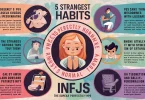When it comes to personality types, few are as intriguing and complex as the INFJ. Often called “The Advocate” or “The Counselor,” this personality type is the rarest, comprising only a small fraction of the population. INFJs are frequently described as old souls, possessing a unique mix of empathy, intuition, and creativity that sets them apart.
But what exactly makes them tick? What are the traits that define this enigmatic personality? If you’ve ever wondered about the secrets behind the INFJ’s mysterious and thoughtful demeanor, you’re in for a treat. Let’s explore ten fascinating facts about the INFJ personality type that reveal why they are so special and often misunderstood.
1. Masters of Reading People
INFJs have an extraordinary ability to read people, often sensing what someone is feeling or thinking before it’s even clear to them. They pick up on subtle cues like body language, tone of voice, and unspoken energy, making them highly attuned to the emotional dynamics in any social situation.
Related
5 Mind-Blowing Psychological Facts About Quiet People
7 Social Norms INFJs Could Never Comprehend
5 Sneaky Tactics Narcissists Use to Target Innocent Souls
7 Habits That Prove You’re An INFJ Type
This intuitive insight allows them to connect deeply, offering empathy and understanding that can feel like a breath of fresh air. However, this sensitivity can be overwhelming. INFJs may absorb the negative emotions of others, leading to emotional exhaustion. They might also struggle to turn off this ability, resulting in a constant state of hyper-awareness that can be mentally draining.
2. Conflict-avoidant but Principled
INFJs typically dislike conflict and will go out of their way to avoid it. They have a natural preference for harmony and often act as mediators, using their empathetic nature to understand all perspectives in a disagreement and resolve tensions peacefully. They prioritize the well-being of others and aim to maintain positive relationships by avoiding unnecessary confrontations. However, when it comes to their core beliefs and values, INFJs are anything but passive.
They have a strong sense of right and wrong and will stand their ground when they feel their principles are being compromised. In these situations, the usually gentle and accommodating INFJ can become surprisingly assertive, driven by a deep sense of justice. This mix of conflict avoidance and strong principles can create internal tension, as they struggle to balance a desire for peace with the need to uphold their convictions.
3. Future-Oriented Visionaries
INFJs are strongly future-oriented. They’re natural planners who frequently consider different possibilities and outcomes, enabling them to set long-term goals and work methodically toward achieving them.
As visionaries, they excel at seeing the big picture, anticipating challenges, and identifying opportunities well in advance, making them effective strategists in roles requiring foresight. However, their focus on the future can sometimes distract them from the present.
INFJs may become so absorbed in what could happen that they overlook what is happening, leading to anxiety or stress over uncertainties. Their tendency to plan for every scenario can make them overly cautious, potentially causing them to miss out on spontaneous experiences. Additionally, their constant striving for an ideal future can create dissatisfaction with the present, as they may feel that their goals are always just out of reach.
4. Passionate About Psychology and Self-Improvement
INFJs are typically drawn to psychology, self-improvement, and understanding the human mind. Their natural curiosity about what makes people tick drives them to explore topics like emotional intelligence, personal growth, and mental health. This interest often leads them to careers in counseling, psychology, or fields where they can encourage self-awareness and personal growth. INFJs are lifelong learners, always seeking to expand their knowledge and refine their understanding of themselves and their surroundings.
However, this intense focus on self-improvement can also lead to self-criticism. INFJs may hold themselves to impossibly high standards, always striving to be better, smarter, or more compassionate. This can create a sense of never being good enough, which is emotionally taxing. Moreover, their deep dive into psychological and emotional topics can make them overly introspective, leading to overthinking or analysis paralysis.
5. Crave Deep, Authentic Connections
For INFJs, surface-level interactions simply won’t do. They crave deep, meaningful connections where they can truly bond with someone on a soul level. They’re typically drawn to people who are open, honest, and willing to explore the deeper aspects of life. These individuals thrive in relationships where they feel understood and valued, often becoming the friend or partner who listens deeply and offers unwavering support.
The downside of this desire for deep connections is that INFJs may find it challenging to form or maintain casual relationships. They might struggle in social situations where small talk is the norm or where the connection feels shallow. This can lead to feelings of loneliness or isolation, as they may have difficulty finding people who meet their need for depth. Additionally, their intense desire for meaningful relationships can sometimes lead them to idealize others, setting themselves up for disappointment when reality doesn’t match their expectations.
6. Intensely Private and Reserved
INFJs are known for their rich inner lives and their tendency to keep it private. They’re often difficult to read, as they guard their thoughts and feelings closely, sharing them only with those they trust deeply. This privacy extends to their public persona as well; INFJs prefer to work behind the scenes rather than in the spotlight. They don’t seek external validation and are content pursuing their goals quietly, without fanfare or recognition.
This reserved nature helps them maintain control over their inner world, protecting themselves from potential emotional harm. While their privacy can be a strength, it can also create challenges in relationships. INFJs’ reluctance to share their inner world can make it difficult for others to get close to them, often leading to misunderstandings or feelings of distance. Their preference for staying under the radar can also prevent them from gaining the recognition they deserve in various aspects of their life.
7. Prefer Communication Through Writing or Creative Outlets
INFJs often prefer to communicate through writing or creative outlets, where they can take the time to articulate their thoughts with clarity and precision. They find this more natural and authentic; it’s easier for them to convey their feelings in a way that aligns with their deep, introspective nature. However, this preference for indirect communication can create challenges in relationships. While writing or creative expression helps them articulate their inner world, it can make direct, verbal communication more difficult.
If they rely solely on these methods, others might not fully grasp their emotions or thoughts, leading to misunderstandings. This can also result in feelings of isolation or frustration, as INFJs may feel that their true selves are not being fully understood or appreciated in their interpersonal interactions.
8. Deep Sense of Responsibility
INFJs are characterized by a strong sense of responsibility, not only for themselves but also for others. They often feel a deep moral obligation to help those in need, contribute positively to society, and uphold their values. This sense of duty drives them to be reliable, conscientious, and committed in their personal and professional lives.
INFJs are often the ones who step up to take on additional responsibilities at work, in their communities, or their relationships. They are motivated by a desire to make a difference and to live in a way that is true to their principles. However, this deep sense of responsibility can become overwhelming. INFJs may take on too much, feeling that they need to be there for everyone and handle everything perfectly. This can lead to stress, burnout, or a sense of being weighed down by others’ demands. Additionally, their strong sense of duty can make it difficult for them to set boundaries, as they tend to feel guilty for saying no or prioritizing their own needs.
9. The INFJ “Door Slam”
The infamous INFJ “door slam” is a coping mechanism where an INFJ completely cuts someone out of their life after repeated hurt or betrayal. This is not done out of spite but rather as a way to protect themselves from further emotional harm. When an INFJ reaches their breaking point, they may feel that the only way to preserve their well-being is to remove the person from their life entirely. This can be a sudden and drastic action, often surprising the person on the receiving end, who may not have realized how deeply they were affecting the INFJ.
While the door slam can be an effective way for INFJs to protect themselves, it also has downsides. It can leave unresolved issues and lingering emotions, as they may not have fully communicated their feelings before cutting ties. This can stir up guilt or regret later on, as they may wonder if there could have been a way to resolve the situation without severing the relationship entirely. Additionally, the door slam can create a reputation for being unforgiving or harsh, which can impact future relationships.
10. Prone to Existential Reflection
INFJs frequently engage in existential reflection, pondering the meaning of life, their purpose, and the larger questions of existence. This reflective nature drives them to explore philosophical and spiritual topics to seek answers to the big questions that many people avoid. Their introspective tendencies often lead them to profound insights about themselves and the world, helping them develop a strong sense of purpose and direction.
This existential reflection is a key part of what makes INFJs so thoughtful and insightful, allowing them to see beyond the surface and explore the deeper layers of life. However, this tendency toward existential reflection can also lead to challenges. INFJs may find themselves grappling with feelings of existential angst or uncertainty, particularly when they feel disconnected from their purpose or when the world doesn’t align with their ideals. This can create a sense of disillusionment or frustration, as they struggle to reconcile their deep inner world with external reality.
Conclusion
The INFJ personality type is a fascinating blend of empathy, intuition, and introspection. They are deep thinkers, visionaries, and advocates driven by a desire to make the world a better place. However, their complex inner world and unique perspective can sometimes make it challenging for them to navigate the external world. Understanding these ten aspects of the INFJ personality can help you appreciate the unique gifts and challenges that come with being an INFJ, whether you are one yourself or have an INFJ in your life.







Leave a Comment